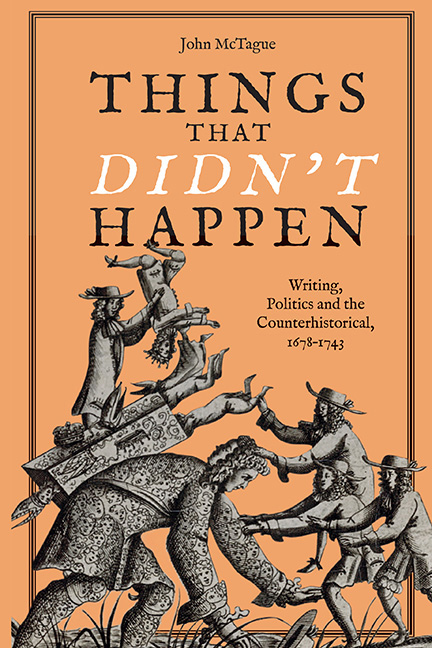Book contents
- Frontmatter
- Dedication
- Contents
- List of Illustrations
- Acknowledgements
- List of Abbreviations
- Introduction
- I Fabrications
- II Failures
- III Speculations
- 5 The Indifference of Number: The South Sea Bubble, 1720–21
- 6 ‘Some Convenient Order’: Mandeville, Berkeley, and the Narration of Ethical Exchange
- IV The Dunciads
- Conclusion: Events that Didn't Happen
- Bibliography
- Index
5 - The Indifference of Number: The South Sea Bubble, 1720–21
from III - Speculations
Published online by Cambridge University Press: 09 October 2019
- Frontmatter
- Dedication
- Contents
- List of Illustrations
- Acknowledgements
- List of Abbreviations
- Introduction
- I Fabrications
- II Failures
- III Speculations
- 5 The Indifference of Number: The South Sea Bubble, 1720–21
- 6 ‘Some Convenient Order’: Mandeville, Berkeley, and the Narration of Ethical Exchange
- IV The Dunciads
- Conclusion: Events that Didn't Happen
- Bibliography
- Index
Summary
THE South Sea Company was originally a Tory initiative, founded in 1711 by the new ministry formed by Robert Harley, intended to counter the dominance of Whig and dissenting interests in the world of finance. In 1714 the company took on the slave trading privileges granted to Britain by the transfer of the asiento as part of 1713's Treaty of Utrecht. John Blunt was Director of the South Sea Company from 1711 until 1721. In 1719, following the apparent success of John Law's Mississippi Company (which had transformed the public debts of France into company stock in 1719), Blunt converted £1,000,000 of government debt into South Sea stock. The project was a triumph, as stock sold above par and profits soared. The next year, the company entered into a bidding war with the Bank of England for the right to convert 60% of the National Debt into shares, for a fee to be paid directly to the Treasury. This scheme sought to deal with the complexity of governmental debt by converting the myriad agreements the state had with its creditors into one easy payment. Blunt's company won, paying £7,500,000 for the privilege of converting £31,000,000 of the National Debt into South Sea Company stock. At first the project looked like a runaway success. Prices rose to a high of around £1000 for stock of £100 face-value in July of 1720. The crash came in September, as prices plummeted to £290; by mid-October they were £170. The ‘bubble’ of 1719 and 1720 certainly did happen: what didn't is the continued growth in value on which the project, and the hopes of some investors, depended. The 1720 crash is the consequence and the cause of the failure to make speculative futures come to pass.
- Type
- Chapter
- Information
- Things that Didn't HappenWriting, Politics and the Counterhistorical, 1678–1743, pp. 141 - 166Publisher: Boydell & BrewerPrint publication year: 2019



